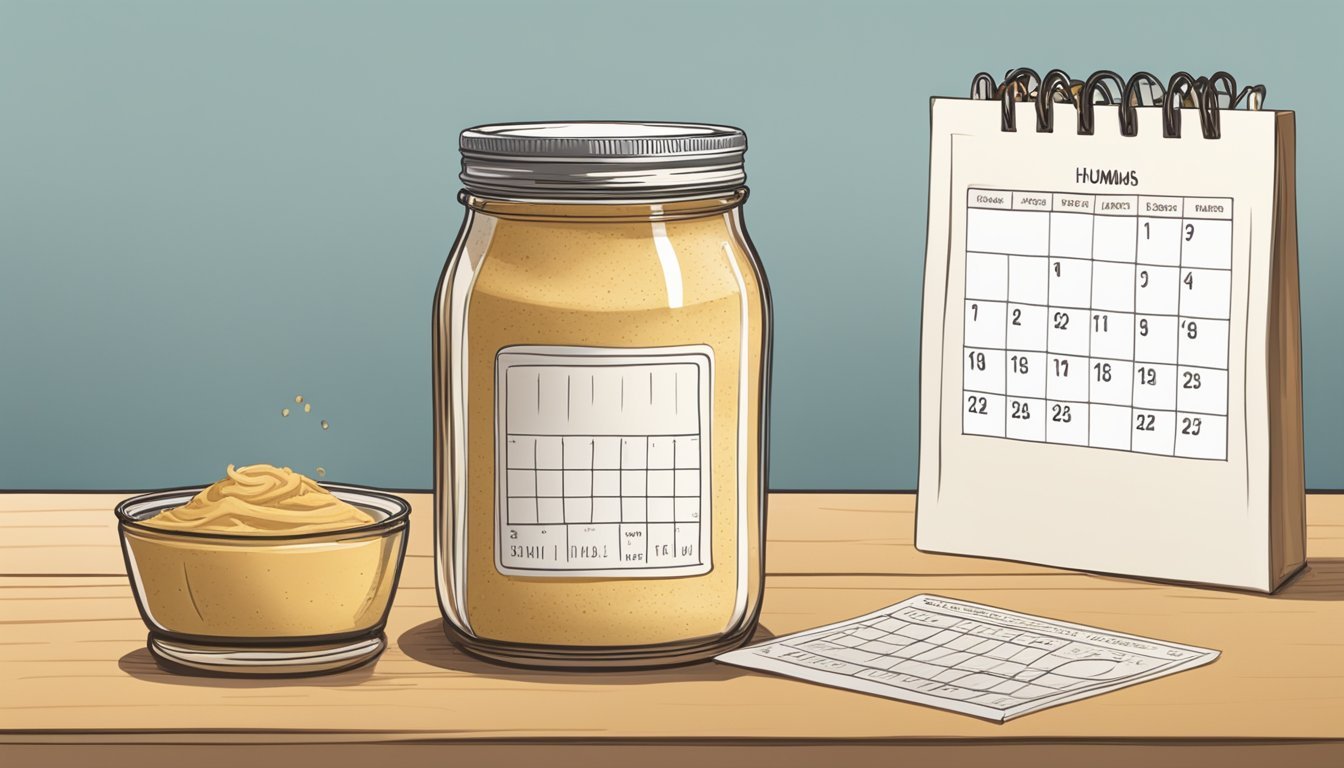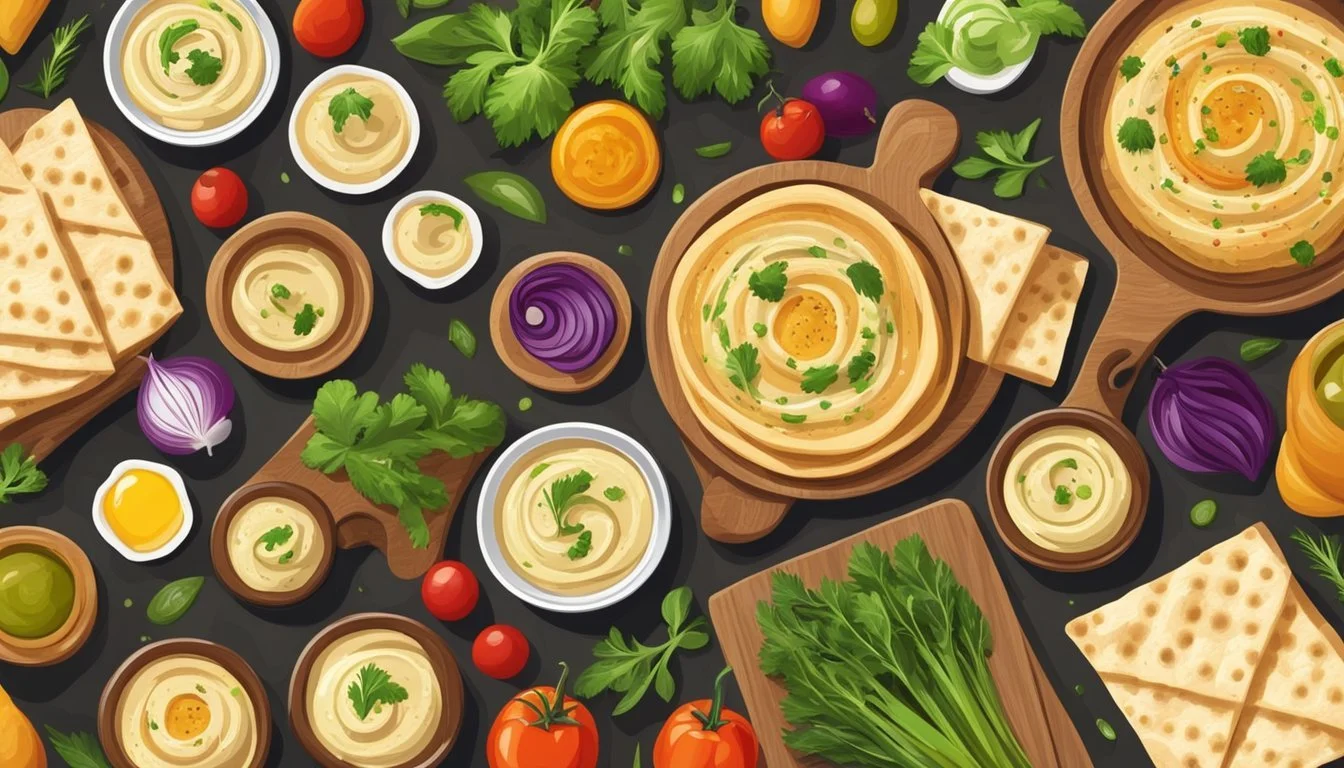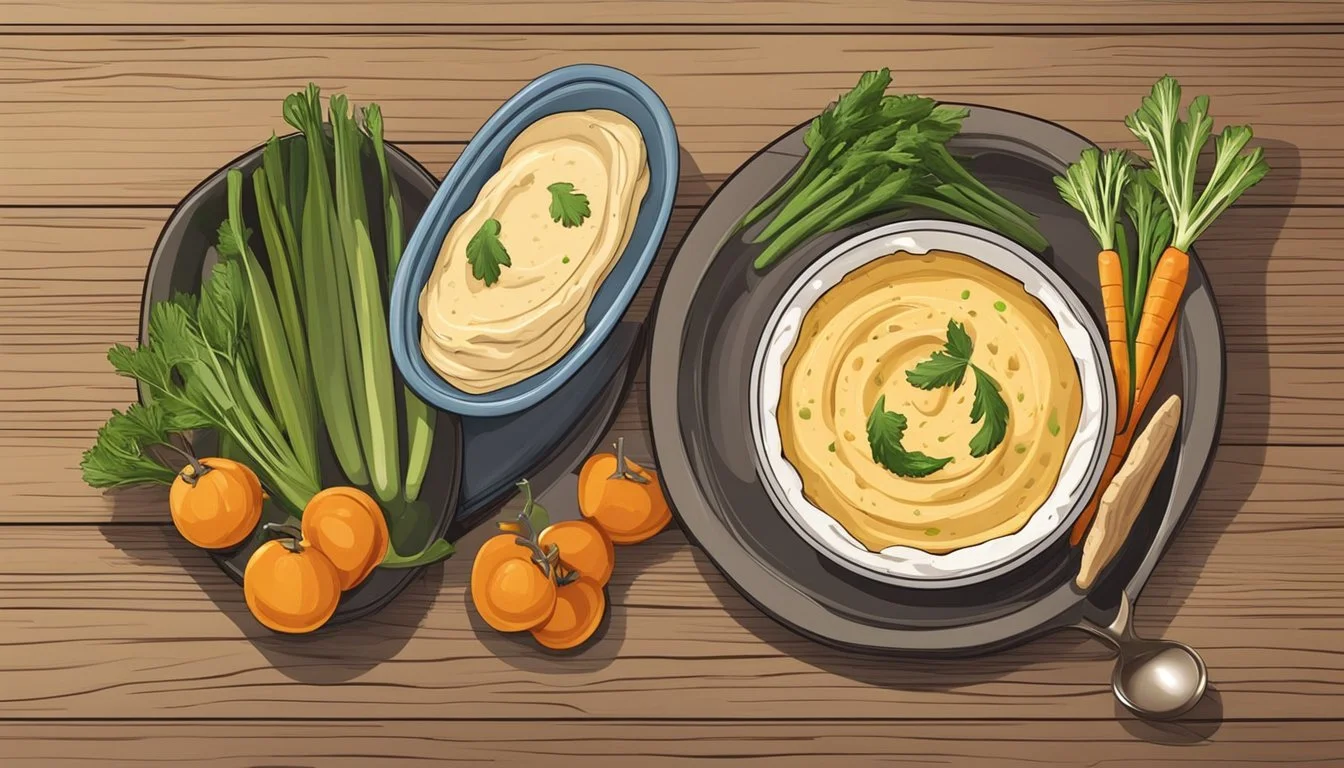How Long Does Hummus Last?
Shelf Life and Storage Tips
Hummus, a traditional Middle Eastern spread, has transcended its origins and become a widely popular dip around the globe. Made from a blend of chickpeas, tahini, olive oil, lemon juice, and garlic, it’s enjoyed for its savory flavor and creamy texture. The shelf life of hummus is a topic of importance for both food safety and quality, given its perishable nature.
When stored in the refrigerator, both homemade and store-bought hummus are expected to maintain their freshness for a limited period. Homemade hummus generally lasts between three to four days, while store-bought varieties typically have a longer shelf life due to preservatives and can last from four to seven days after opening. It's recommended to consume any opened hummus within a week to ensure both safety and taste.
To identify if hummus has expired, a visual inspection for mold, an assessment of off smells, or any change in taste can be reliable indicators. A sour smell or taste is often the first sign that hummus has gone bad. These characteristics underscore the importance of proper storage in an airtight container and consistent refrigeration to prolong the life of this versatile dip.
Understanding Hummus
Hummus is not only a delicious dip enjoyed around the world but also a nutritious addition to any diet. This section explores its origins and nutritional benefits.
Origins and Popularity
Originating from the Middle East, hummus has become a global culinary favorite. Traditionally made from chickpeas, tahini (sesame seed paste), lemon juice, and olive oil, this savory spread is integral to vegetarian and vegan diets due to its versatility and nutrition. It has been adopted widely, finding a place in snacks, meals, and even fine dining.
Nutritional Value
A single serving of hummus is packed with:
Protein: Essential for muscle repair and growth, making it a favorite among vegetarians and vegans.
Fiber: Helpful in digestion and promoting a feeling of fullness.
Healthy fats: Predominantly unsaturated fats from olive oil and tahini, known for their heart-healthy properties.
Vitamins and Minerals: Including B vitamins, iron, and more.
Hummus contributes to dietary fiber intake which is crucial for gut health and has been linked to reduced risks of heart disease. Its ingredients, like chickpeas and olive oil, contain anti-inflammatory properties and antioxidants, reinforcing its reputation as a healthful choice.
Types of Hummus
Hummus variations fall primarily into two categories: homemade and store-bought, with numerous flavored variants under each. The choice between these types may be influenced by factors such as preference for natural ingredients, convenience, or specific dietary needs.
Homemade vs. Store-Bought
Homemade hummus typically consists of chickpeas, tahini, lemon juice, garlic, and olive oil. It allows for complete control over ingredient quality and the flexibility to adjust flavors to personal preference. The homemade version is generally consumed within 3-4 days when refrigerated due to the absence of preservatives.
On the other hand, store-bought hummus comes in various shelf-stable and refrigerated forms. Refrigerated store-bought hummus often includes preservatives that extend its shelf life up to 7 days once opened. Canned hummus, a less common type found on store shelves, can last up to 2 months past the best by date if unopened, and 4-7 days once opened and stored in the fridge.
Flavored Variants
Beyond the classic recipe, hummus is available in a variety of flavors. Flavored variants typically include additional ingredients that create distinct taste profiles:
Red pepper hummus incorporates roasted red peppers, combining their sweet and smoky flavor with the traditional hummus base.
Avocado hummus blends in the creamy texture of avocado, adding a subtle richness and a boost of heart-healthy fats.
Black bean hummus substitutes black beans for chickpeas, offering a twist with a heartier texture and a slightly different nutritional profile.
Each variant combines the foundational elements of traditional hummus with these feature ingredients, offering consumers a wide array of choices suited to their personal taste and dietary preferences.
Storage Guidelines
Proper storage is essential for maintaining the quality and safety of hummus. These guidelines will ensure that hummus remains fresh for as long as possible.
Refrigeration Practices
Upon purchase or preparation, hummus should be immediately stored in the refrigerator. An airtight container is crucial to prevent contamination and dehydration. For store-bought hummus, once the seal is broken, it should be consumed within 4-7 days. On the other hand, homemade hummus tends to have a shorter refrigerator life of about 3-4 days due to the absence of preservatives.
Freezing Techniques
Hummus can be frozen to extend its shelf life. To freeze hummus, one should place it in an airtight container and ensure there is minimal headspace to prevent ice crystal formation. Frozen hummus can last for up to 4 months. When ready to use, one should defrost frozen hummus in the refrigerator for several hours or overnight to retain quality and texture.
Shelf Life Factors
Several factors affect the shelf life of hummus, including the presence of preservatives, the temperature at which it is stored, and exposure to air and contaminants:
Expiration Date: Always adhere to the expiry date on store-bought hummus, but remember that once opened, the hummus's shelf life diminishes to about a week.
Homemade Hummus: Typically lacks preservatives, which reduces its shelf life compared to commercial brands.
Storage Conditions: Keeping hummus in an airtight container in the fridge is imperative. Even brief periods outside of refrigeration should not exceed two hours to avoid spoilage.
Identifying Freshness
When determining the freshness of hummus, individuals should rely on sensory indicators such as smell, taste, and appearance. These distinct signs can help ascertain if the hummus is still of good quality.
By Smell and Taste
One should first assess the smell of the hummus. Fresh hummus typically has a nutty and slightly tangy aroma. If the product emits a sour smell or an off odor, it may indicate spoilage. The taste is also a critical factor; hummus that tastes sour or significantly different from its original flavor should not be consumed.
Texture and Appearance
The texture and appearance of hummus serve as reliable indicators of its freshness. Hummus should have a creamy consistency, without any separation of oil. Visual signs of spoilage include the presence of mold, or any discoloration. If the texture has become excessively thick or watery, the product may be past its best quality.
Food Safety and Spoilage
When it comes to food safety, ensuring that hummus is consumed before it spoils is crucial to prevent foodborne illnesses. The shelf life of hummus can be extended by preservatives and proper storage, but once spoiled, it poses health risks due to bacterial growth.
Signs of Spoilage
Hummus that has gone bad typically exhibits several clear signs:
Odor: A sour or unpleasant smell is often the first indication of spoilage.
Taste: Any deviation from the fresh, nutty flavor of hummus should be considered a sign of spoilage.
Texture: Separation or a noticeable change in consistency can indicate that hummus is no longer safe to eat.
Mold: The presence of mold, which may appear as fuzzy, green, or black spots, clearly indicates that the hummus should be discarded.
Fans of hummus should regularly check for these signs to ensure their safety when consuming the product.
Effects of Preservatives
Preservatives play a pivotal role in extending the shelf life of hummus and reducing the rate of spoilage. Here's how:
High-Pressure Processing (HPP): This method kills pathogenic bacteria without heating, maintaining the quality of hummus while making it safer for longer consumption.
Heat Treatment: Applied to store-bought varieties, it slows bacterial growth, extending shelf life.
Chemical Additives: Certain preservatives hinder the growth of bacteria and mold, although homemade hummus typically lacks these additives, leading to a shorter fridge life.
Understanding the role of preservatives helps consumers make informed decisions on storing and consuming hummus within a safe time frame to prevent foodborne illnesses.
Best Practices for Consumption
When consuming hummus, it is essential to understand not only how to serve this Middle Eastern spread but also optimal pairings to enhance its natural flavors.
How to Serve
To maintain the quality and freshness of hummus, one should always serve it chilled. It should be taken out of the refrigerator right before consumption. Using a clean spoon or spatula every time to scoop hummus is crucial to prevent bacterial contamination. For individual servings, it's best to portion out the desired amount rather than dipping directly into the storage container.
Pairings and Recipes
Hummus is versatile and pairs well with a variety of foods:
Pita Bread: A traditional pairing that complements the creamy texture of hummus.
Vegetables: Raw vegetables such as carrots, cucumbers, and bell peppers offer a crispy contrast.
Chips and Crackers: Opt for plain or lightly seasoned chips and whole grain crackers to dip.
Sandwiches: Use hummus as a flavorful spread on sandwiches for added protein and taste.
Here are some recipe ideas:
Middle Eastern Plate: Combine hummus with falafel, tabbouleh, and olives.
Hummus Wrap: Spread it on a tortilla, add roasted vegetables, and roll it up.
Flavored Hummus: Mix in roasted garlic, red peppers, or olives to create a variety of flavors.
Maximizing Shelf Life
Extending the shelf life of hummus involves proper sealing and storage techniques along with careful rotation and utilization. These strategies can prevent spoilage and reduce the risk of food poisoning, especially since hummus is a perishable product.
Sealing and Storage
Properly sealing hummus is crucial for maintaining its freshness. Unopened hummus from grocery stores typically comes with a best-by date and can be stored in its original packaging until this date. Once opened, hummus should be kept in an airtight container. This limits its exposure to air and moisture, which are catalysts for bacterial growth. Plastic wrap or aluminum foil can be used to cover the surface of the hummus before sealing with a lid, especially if freezing.
For refrigeration:
Seal opened hummus and store at consistent cool temperatures.
Use clean utensils each time to avoid introducing contaminants.
Rotation and Utilization
Regularly rotating hummus containers ensures that older containers are used first, adhering to the "first in, first out" principle. Incorporating hummus into meals soon after opening can help utilize it before it begins to deteriorate. Recognize that signs of spoilage, such as an off smell or taste, indicate that the hummus should be discarded to avoid the risk of food poisoning.
Do not eat hummus that smells or tastes off.
Respect use-by dates to ensure quality and safety.
By implementing these methods, consumers can effectively extend the shelf life of their hummus and enjoy it at its best quality.
Purchasing Tips
When purchasing hummus, buyers should focus on the label for freshness indicators and brand selection tailored to their preference for natural ingredients and traditional Mediterranean flavors.
Label and Expiration Date Insights
Consumers should always check the expiration date on store-bought hummus to gauge freshness. It's important to note that the expiry date is different from the shelf life; the latter can sometimes extend beyond the printed date. Store hummus in the refrigerator immediately after purchase to maintain its quality up to the marked expiration.
Choosing Brands and Varieties
Brand selection is crucial when choosing hummus. Look for brands known for fewer additives, as these often offer a product closer to traditional Mediterranean hummus. Varieties of hummus can range from plain to those with roasted red pepper, garlic, or olive toppings. Each brand may have a different shelf life, so buyers should select based on personal flavor preference and the guarantee of freshness provided by the expiration date.
Economic and Lifestyle Considerations
In evaluating the shelf life of hummus, consumers typically weigh the cost against their dietary habits. This section sheds light on the balance between the economic investment in hummus and its role within a health-conscious lifestyle.
Cost Evaluation
When purchasing hummus, individuals should consider the unit price and shelf life. Hummus from grocery stores may vary in cost but generally offers the convenience of longer shelf life due to preservatives. One must balance the potential waste from spoilage against the savings from buying in larger quantities. Investing in homemade hummus can be more economical, although its shelf life is shorter, lasting up to 7 days in the fridge.
Dietary Impacts
Hummus is renowned as a healthy dip option rich in dietary fiber and part of a Mediterranean diet. Consumers hope to reap the health benefits without the inconvenience of frequent preparation or purchase. The presence of dietary fiber makes hummus a beneficial addition to one's diet, but one must be aware that it is perishable and requires proper storage to maintain its nutritional value.










